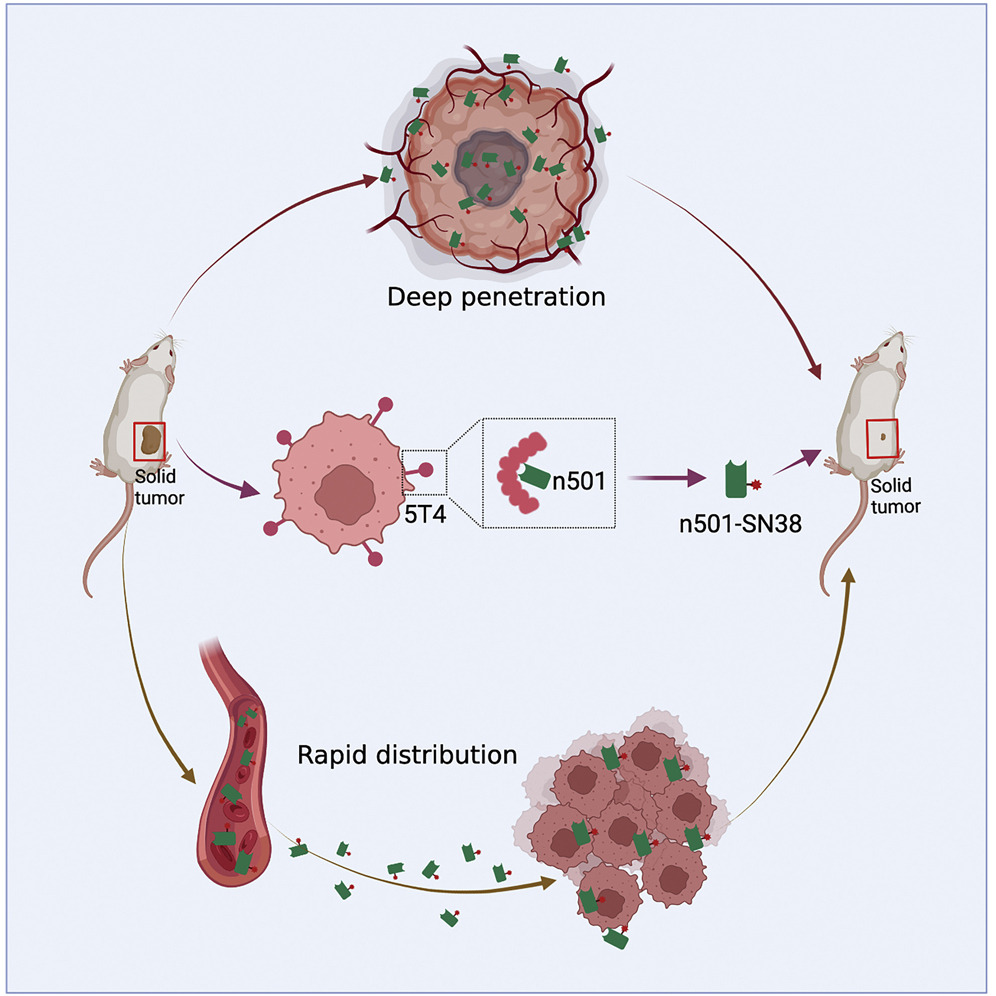An antibody-drug conjugate (ADC) is formed by linking monoclonal antibodies and small molecule cytotoxic drugs through linkers. It has both the tumor targeting of antibody drugs and the strong tumor-killing activity of chemotherapeutic drugs, becoming one of the hottest research and development directions in the field of biotechnology drugs. However, antibody-drug conjugates are limited by issues including the large molecular weight of full-length antibodies, poor tumor penetration, and low intratumoral diffusion efficiency, and their efficacy in solid tumors still needs to be broken through.
Recently, a study developed a fully human single-domain antibody-drug conjugate (UdADC) with high stability, rapid distribution, and strong tumor penetration, and confirmed that this new drug has significant advantages over traditional antibody-coupled drugs in tumor organs, tumor microspheres, and tumor models in mice.
In the preliminary research, the team integrated the design concept of synthetic biology with the theoretical technology of antibody engineering, and established an innovative fully human single-domain antibody research and development system. In this study, the team further developed a high-affinity fully human single-domain antibody n501 against carcinoembryonic antigen 5T4.

A fully human single-domain antibody (UdAb) targeting the oncofetal antigen 5T4. (Wu, 2022)
The team found that compared with the traditional camel-derived single-domain antibody, the fully human single-domain antibody n501 has better stability and can still maintain antigen-binding activity under severe storage conditions such as high temperature. The team analyzed the high-resolution three-dimensional structure of the complex of n501 and 5T4 by means of structural biology, and the result showed that the fully human single-domain antibody has a spatial structure very similar to the traditional camel-derived single-domain antibody. Moreover, n501 can bind tightly to eight leucine-rich repeats (LRRs) of the 5T4 antigen at the same time, revealing the molecular mechanism of n501’s high stability and high antigen affinity.
Further, the researchers mutated the serine at position 85 in the fully human single-domain antibody n501 to cysteine to realize the site-specific conjugation of the small molecule drug SN38. This new type of drug is named fully human single-domain antibody-drug conjugate (UdADC). In order to make a systematic comparison with traditional mAb-based ADC drugs, the team developed a high-affinity fully human single-domain antibody m603 targeting the same target 5T4 using the fully human single-domain antibody R&D platform established earlier. And then they used traditional coupling technology to couple SN38 to m603 to prepare the ADC. In in vitro anti-tumor cell experiments, both UdADC (n501-SN38) and ADC (m603-SN38) can effectively and specifically kill cell lines with high expression of 5T4. Because the fully human single domain antibody (13 kDa) has a smaller molecular weight than the traditional IgG mAb (150 kDa), the team found that UdADC has a far more superior tumor tissue penetration ability far superior than ADC.
In the pancreatic cancer organ model and three-dimensional tumor microsphere model, the penetration depth of UdADC is much better than that of ADC based on traditional monoclonal antibodies, and can accumulate more effectively in the tumor, while ADC mostly stays on the superficial surface of the tumor. In addition, in the pancreatic cancer tumor-bearing mouse model, UdADC can quickly locate the tumor site and accumulate efficiently within half an hour after injection, so it can more effectively inhibit the growth of the tumor in mice and show more efficient anti-tumor activity.
In summary, fully human single-domain antibody-drug conjugates have excellent characteristics of high stability, rapid distribution to tumor sites, deep tumor penetration, high tumor uptake, etc. It can be used as a research and development platform for a new generation of antibody conjugated drugs, in order to develop efficient anti-tumor targeted drugs for clinical treatment of solid tumors.
